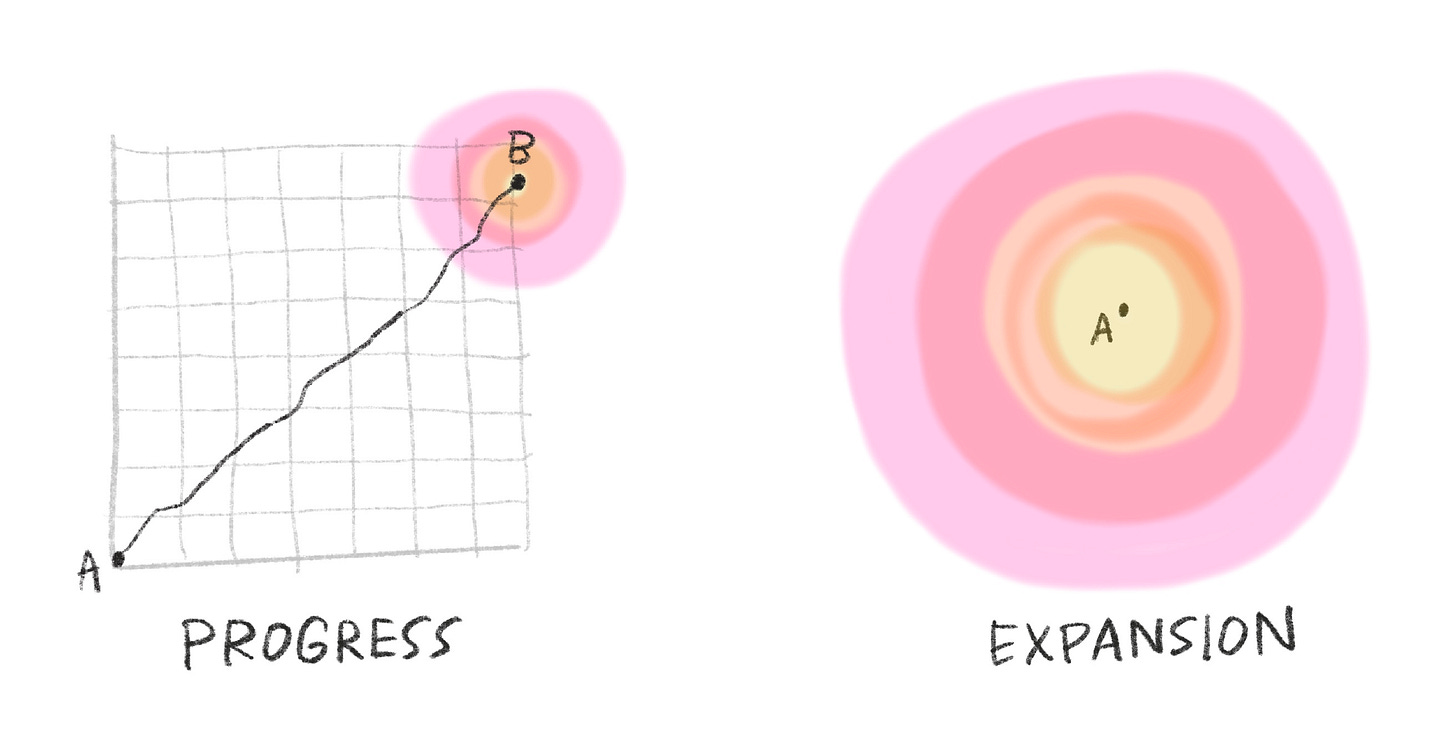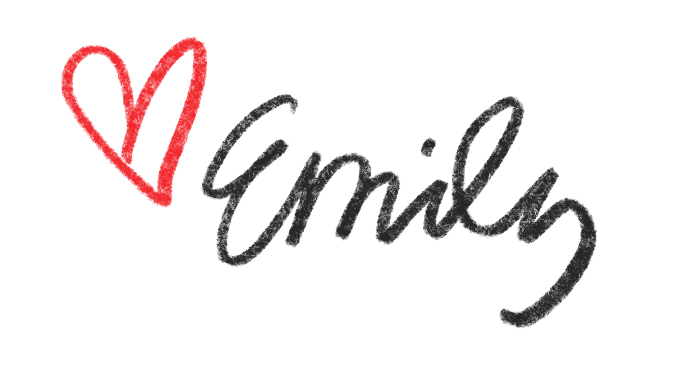Is it dumb to quit something I worked hard to get?
Am I a failure and/or a flake?
ANNOUNCEMENTS & THINGS:
If you’re an entrepreneur with an established brand that sells physical products, who’s seeking a game-changing combo of guidance, community and support: there are 3 spots left in The Greater Goods Alliance, a live, 6-month small group mentoring and mastermind program co-led by me and Lisa Congdon. This experience will be SO FREAKING VALUABLE and there’s nothing else like it for product-based businesses.
This is a curated group, designed to provide maximum value to all who participate; we’ve turned down 15 great applicants whose businesses weren’t quite right for this round. I mention this because I think a lot of people would just take everyone’s money? And we’re not doing that. Get all the details and apply here. Applications close on Tuesday 4/23, and we begin on May 8th.
If you’re curious to hear (and watch!) me talking about my story, liminal space, and the “WTF do I do now” of it all, go check out my interview with
on her Substack Life (un)Learned, where she writes about working to unlearn ingrained beliefs and habits, and navigating life transitions. Kim is a Substack kindred spirit, and I loved this conversation!Hi everyone,
I’m writing this from seat 19D of an Alaska Airlines flight that’s been sitting on the tarmac at PDX for 90 minutes and counting, because the “wing balance system” is malfunctioning, which feels somewhat important? But that’s not the point of this email.
The point is that I’ve had multiple conversations in the last two weeks, with both friends and 1:1 clients, that center around this question, so I’m writing about it:
Is it self-indulgent or foolish to quit a “dream career” that I would have killed for at one point? Should I just suck it up and keep going? Will people think I’m a failure or a flake? AM I a failure or a flake? What does wanting to quit things say about who I am?
Okay first, before I start talking about quitting stuff, a disclaimer about how I’m not saying everyone should just run around bailing on everything all the time, which I’m putting in a footnote.1
Modern western society’s definition of what it means to “never give up” — and its relationship to the ideas of success and failure, can be pretty twisted.
Society defines a “successful” marriage as one we stay in until we die.
Society says a “successful” career is one that perpetually builds on itself, in which we climb higher and higher, making more and more money, until we retire.
In other words, “success” requires us to stay beholden to a decision made at some point in the past — sometimes the distant past — by a version of ourselves who had less life experience, less information, and perhaps not a whole lot in common with the person we’ve evolved to become.
In a culture in which perseverance is not only a virtue, but glorified like a religion; in which our media, movies, and books are filled with stories of individuals who pushed through hardship and “won,” in which we’re taught that winners never quit, in which the dictionary definition of “give up” is literally “to cease making an effort; to resign oneself to failure”—
…It’s no wonder so many of us are really freaking confused about when it’s OK to walk away from something we once desperately wanted and worked hard to achieve, but doesn’t feel right anymore.
The graph on the left is basically Western culture’s depiction of what a “successful” life should look like, which not un-coincidentally, looks like the earnings report of a profitable corporation. Linear progress!
But what if, instead of a line that goes perpetually up and to the right, with the goal of reaching a future point of “success,” the point of being alive is expansion? What if another, more accurate definition of success is the process of broadening our experiences, growing in different directions, deepening our understanding of ourselves and the collective, gathering new information, and adjusting our decisions accordingly as we go?
In the “expansion” illustration, there is no point B. Instead of “before and after,” there’s a perpetual during. This, as it turns out, is a much more accurate portrayal of what it’s like to exist.
When we learn to examine ourselves, become observers in our own lives, go to therapy, practice mindfulness, go scream in the woods, do breathwork, get into plant medicine, whatever it is that helps us begin to peel off all our familial and cultural and social conditioning and say “wow, okay, who the fuck even AM I and wow, where did all these beliefs come from?,” is to embrace being a changing self in a changing world.
To live in a changing world as a changing self, but not allow your behavior to be informed by the new information you’re taking in, is like having a computer and never updating its operating system. It’ll keep working for a while — years, even — until it doesn’t. At some point, the old program is no longer compatible.
The person I was in 2011 really wanted to run a complex organization with lots of people. I didn’t just think I wanted it; 2011 Me really did want it. And then, when I actually experienced what it was like to have 15 employees—once I had that information—I realized the reality of that life was very much at odds with what felt good to me. But I kept going, because of my conditioned ideas about what “success” was, the fulfillment I believed was waiting on the other side of achievement, my sense of responsibility to others, and the tyranny of “let me just get through this next part, and then things will be better.”
Last month, in building the press page of my new site, I googled myself in order to find and choose some pieces to link to. Let me tell you, there is nothing more humbling than a google image search of yourself during the years when the permanent expression on your face was “deer in headlights whose blood was replaced with espresso.” (Please, nobody use this as an AI prompt.)
Exhibit A.
Often, when we work towards something for a long time and achieve it, either the reality of the thing is different than what we thought — or WE are different than when we started, with different goals and interests and things we care about. When we twist ourselves into knots to stay aligned with the old goal, out of “should” or “supposed to” or “not wanting to be a quitter,” we abandon ourselves in the process.
There’s no point in being your own boss—in work, or in any life decision—if you’re going to use that privilege to be the worst boss you’ve ever had.
In conversations about quitting, failure, and walking away, there’s a word and concept I think is underused: completion.
Unlike all these other terms that come loaded with judgment (our own, other people’s), and the implication that we’ve done something wrong or are lacking in moral fiber, “completion” is neutral. It says “this was a thing, this thing is now over.” It acknowledges that the thing was never meant to last until the end of time. A completed relationship isn’t a “failed” relationship; a completed business venture isn’t a “failed” one. There is infinite value in a completed experience. You can be proud of it AND be done with it.
Declaring something complete also means actively calling back your energy from that thing, which allows you to choose to re-allocate that energy somewhere else.
If you’re looking for permission to complete something that some part of you knows is hurting you, let it be this. Let my Google Image Search Face be your sign.
If that 2017 pic is a shot of warm vodka served from the trunk of a Chrysler, this pic below from last week is a fresh lemonade chaser with a sprig of goddamn mint.
We can heal, we can change. It’s okay to be done.
Photo by Sarah Deragon of Portraits to the People. Earrings by Your Strange Friend. Highly recommend both.
We can all agree there’s obvious utility in learning not to bail when things get hard, as they inevitably do. Learning any new skill, or building a practice, or navigating a partnership/marriage, takes patience and commitment. Self-confidence and self-trust come from learning to stick with things we’re not immediately awesome at. There are massive rewards that can, and do, come from making a commitment to seeing something through. My mom tried to impart this lesson from 1985 to 1987, when we all suffered through 3 years of me trying to learn how to play the saxophone. (I quit when I got to middle school and decided I’d rather spend my free time watching boys fall off skateboards.)












Thanks for the thought provoking post. It helped me think more about this theory I have:
That certain people have great ambition for "more." That it is harder to change that drive for ambition than it is to change the object of that ambition.
So what are the objects of ambition that are not corrosive?
Helping people, being good at your familial roles, friendship, self-awareness, writing (has recently become a core ambition for me, connected to self-awareness), pursuit of knowledge, staying healthy and so on.
Along with choosing worthy objects of ambition, I think a diversified approach is essential. These ambitions are the source of your self-esteem so you don't want to depend on just one.
So many things Emily!! First off thank-you for being you and being so generous with your time and story for our interview. As for the rest...
-Exhibit A. Holy shitballs.
-Computer metaphor regarding the operating system. Perfection.
-Only two spots left and you turned down 14 already because they're not the right fit?! Wow. Integrity.
-Expansion drawing. Yes, please.
-Completion instead of quit. Beautiful.
-Last week Emily pic. You're energy is gorgeous. Pretty much says it all.
I'm so happy for you that you are coming out of the wilderness of these last several years with a renewed sense of purpose. Lucky are those that will get to work with you and Lisa and benefit from your knowledge and insight.